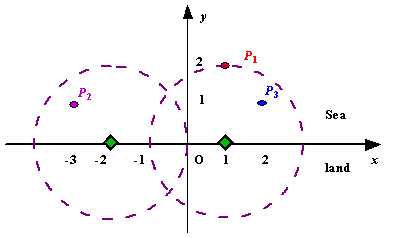Radar Installation
| Time Limit: 1000MS | Memory Limit: 10000K | |
| Total Submissions: 54593 | Accepted: 12292 |
Description
Assume the coasting is an infinite straight line. Land is in one side of coasting, sea in the other. Each small island is a point locating in the sea side. And any radar installation, locating on the coasting, can only cover d distance, so an island in the sea can be covered by a radius installation, if the distance between them is at most d.
We use Cartesian coordinate system, defining the coasting is the x-axis. The sea side is above x-axis, and the land side below. Given the position of each island in the sea, and given the distance of the coverage of the radar installation, your task is to write a program to find the minimal number of radar installations to cover all the islands. Note that the position of an island is represented by its x-y coordinates.

Figure A Sample Input of Radar Installations
We use Cartesian coordinate system, defining the coasting is the x-axis. The sea side is above x-axis, and the land side below. Given the position of each island in the sea, and given the distance of the coverage of the radar installation, your task is to write a program to find the minimal number of radar installations to cover all the islands. Note that the position of an island is represented by its x-y coordinates.

Figure A Sample Input of Radar Installations
Input
The input consists of several test cases. The first line of each case contains two integers n (1<=n<=1000) and d, where n is the number of islands in the sea and d is the distance of coverage of the radar installation. This is followed by n lines each containing two integers representing the coordinate of the position of each island. Then a blank line follows to separate the cases.
The input is terminated by a line containing pair of zeros
The input is terminated by a line containing pair of zeros
Output
For each test case output one line consisting of the test case number followed by the minimal number of radar installations needed. "-1" installation means no solution for that case.
Sample Input
3 2 1 2 -3 1 2 1 1 2 0 2 0 0
Sample Output
Case 1: 2 Case 2: 1
Source
#include <stdio.h>
#include <string.h>
#include <math.h>
#include <algorithm>
#define maxn 1010
using namespace std;
struct Node {
double u, v;
friend bool operator<(const Node& a, const Node& b) {
return a.u < b.u;
}
} E[maxn];
int N, D;
int main() {
int i, ok, id, ans, cas = 1;
double x, y, d, flag;
while(scanf("%d%d", &N, &D), N) {
printf("Case %d: ", cas++);
ok = 1; id = 0;
for(i = 0; i < N; ++i) {
scanf("%lf%lf", &x, &y);
if(y > D) ok = 0;
if(!ok) continue;
d = sqrt(D * D - y * y);
E[id].u = x - d;
E[id++].v = x + d;
}
if(!ok) {
printf("-1\n");
continue;
}
sort(E, E + id);
flag = E[0].v; ans = 1;
for(i = 1; i < N; ++i) {
if(E[i].u <= flag) {
if(E[i].v <= flag) flag = E[i].v;
continue;
}
++ans; flag = E[i].v;
}
printf("%d\n", ans);
}
return 0;
}




















 1108
1108

 被折叠的 条评论
为什么被折叠?
被折叠的 条评论
为什么被折叠?








